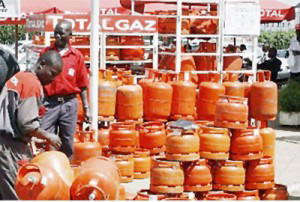The cost of refilling a 12.5kg cylinder of Liquefied Petroleum Gas (LPG), commonly known as cooking gas, has skyrocketed to ₦25,000 this week, up sharply from ₦17,500 just a week ago. Market surveys reveal that 1kg of gas now sells between ₦1,500 and ₦2,000, depending on location, leaving many households anxious as prices continue to swing unpredictably.
The Executive Secretary of the Nigerian Association of Liquefied Petroleum Gas Marketers (NALPGAM), Bassey Essien, linked the sudden price surge to recent supply disruptions caused by the strike action of the Petroleum and Natural Gas Senior Staff Association of Nigeria (PENGASSAN).
According to Essien, Dangote Petroleum Refinery, now Nigeria’s biggest local supplier of cooking gas, was unable to distribute products effectively during the strike. Many dealers couldn’t replenish their stock, and what we’re seeing now is simply the effect of demand outstripping supply. He, however, expressed optimism that the market would stabilize soon now that the industrial dispute has been resolved.
Aliko Dangote, owner of the refinery, had earlier spoken about Nigeria’s worsening energy poverty and the need to make LPG more accessible. He warned that if distributors fail to reduce prices, the refinery may start selling directly to consumers to help households switch from firewood and kerosene to cleaner LPG for cooking.
Before Dangote’s entry into the market, the Nigeria Liquefied Natural Gas Limited (NLNG) was the country’s leading supplier of domestic cooking gas. The company noted that since 2007, it has supplied butane, the primary component of LPG, to homes across Nigeria. In 2022, NLNG announced that it was dedicating 100% of its butane production to meet the nation’s domestic needs, ensuring that all its output is now consumed locally.
NLNG added that it delivers cooking gas to licensed coastal terminals in Lagos and Rivers States, with plans to expand to Delta and other regions. It also revealed that a special vessel has been deployed to guarantee consistent deliveries. “By bringing cooking gas closer to consumers, our aim is to make it more available, accessible, affordable, and acceptable to every Nigerian household,” the company said.




